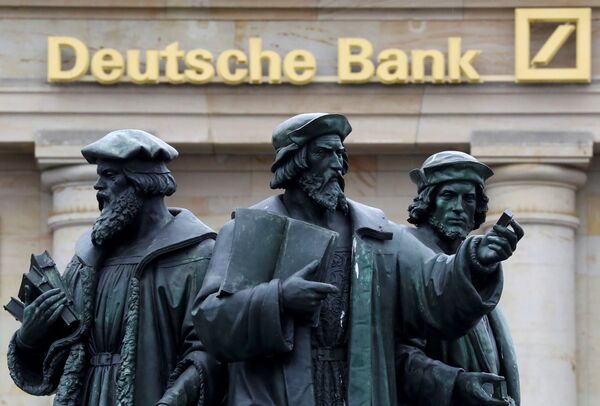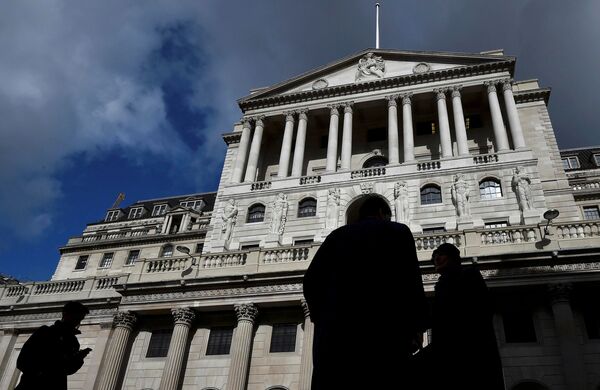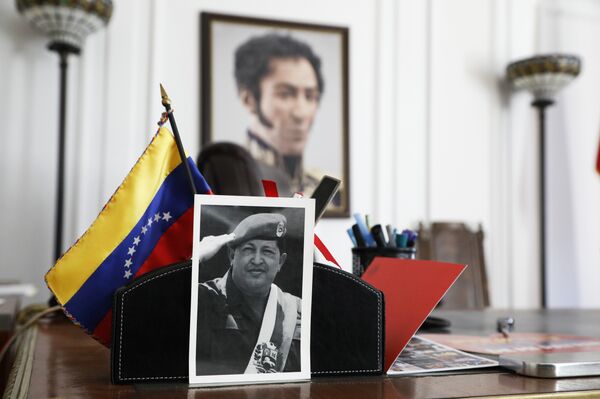On 4 June, Bloomberg reported that Deutsche Bank AG had confiscated 20 tonnes of Venezuelan gold as collateral citing Caracas' failure to make interest payments on a 2016 gold swap agreement valued at $750 million. Although the agreement was due to expire in 2021 the bank closed out the contract earlier. In much the same vein, Citigroup Inc. seized Venezuelan gold in March.
"These banks — in essence acting in quiet concert — closed their agreements early so as to hurt Venezuela's credit repayment reputation and sovereign ratings further", says Pye Ian, a private equity executive and former precious metals commodities trader. "Juan Guaidó — who has been urging a coup and 'regime change' against the Venezuelan majority population's wishes — has been deployed as supposed ‘solution provider' for the gold/debt default issue".
Interim President Juan Guaido and the National Assembly offer unity and democracy to begin the path toward restoring Venezuela to democracy and prosperity. The world must work with President Guaido to prevent the humanitarian crisis in Venezuela from worsening. https://t.co/CW9V9es99Y
— John Bolton (@AmbJohnBolton) 8 июня 2019 г.
The precious metals expert highlighted that in Venezuela's case gold is "not only a Tier 1 Asset as per the designation of the Bank for International Settlements itself" but "means of both immediate currency for [the country] and a bedrock monetary asset for eventually stripping itself off of the dollar standard as global reserve and monopoly oil currency standard".
"Gold is money. Always has been, always will be. Recent events involving the US Treasury seeking to block gold usages in global transactions for Venezuela, Iran, Turkey and others is a latest testament to that fact", he stressed.
Dr Mehmet Ozkan, a senior fellow with the Centre for Global Policy (CGP) think tank, echoed Ian by saying that the move is part of a broader effort to "corner" President Nicolas Maduro and the Venezuelan government economically.
"What's happening is very important in terms of economic cornering of Venezuela and the Maduro government because as you know, just Maduro is giving a food package to around 6 million people, so he needs cash. If he cannot provide that cash to buy the food package in cities, even his main supporters will start questioning his ability to govern Venezuela", Ozkan elaborated.
In March 2019, the Maduro government failed to buy back gold from Citigroup Inc. for nearly $1.1 billion. In 2018 the Central Bank of Venezuela (BCV) paid $172 million to Citibank to recover part of the gold it had put up as guarantee for a $1.6 billion loan. According to Reuters, the BCV was supposed to pay another $400 million to Citibank in 2020 under the agreement, but the financial institution took the gold instead.

As a result, Deutsche Bank AG and Citigroup Inc. gained control of around $1.4 billion of the Venezuelan government's bullion which they can use to recover the value of loans returning the difference to Venezuela. However, this money will not end up in the coffers of the BVC because of the US Treasury's sanctions, imposed on the Central Bank of Venezuela on 17 April 2019.
Ian drew attention to the fact that Deutsche Bank and Citigroup had not sought to restructure Venezuela's debt after the said defaults, as had been done with the Greek defaults four years ago. "No, by contrast, this economic subterfuge is part of Venezuela's clearly being targeted for isolation and state collapse", he pointed out.
"One must also ask if this was a genuine case of Venezuela defaulting in the classic financial sense or not? That is because since the US government imposed sanctions on the BCV in April 2019, the banks had invoked a condition of the contracts to retain ownership of the bars, and both investment banks had resolved that an 'event of default' had occurred due to US sanctions, per se, as established in agreements underpinning the gold swap deals", the precious metals expert explained, adding that the gold would have been seized anyway regardless of the Maduro's government firm intention of servicing the debt.
In fact, "Deutsche Bank and Citigroup helped ambush Venezuelan gold on behalf of Western governments who want Maduro immediately replaced by [Juan] Guaido", he opined.
Meanwhile, it has been reported that the government of self-declared interim president of Venezuela Juan Guaido asked Deutsche Bank AG to deposit $120 million out of Nicolas Maduro's reach. The sum represents the difference in price from when the gold was acquired to current levels.

Bank of England Had Delayed Venezuela's Gold Repatriation for Months
In late January, the Maduro government failed to repatriate the country's gold valued at $1.2 billion from the Bank of England (BoE) blocking Caracas' efforts on 25 January. The move came two days after the head of the disempowered National Assembly, Juan Guaido, proclaimed himself interim president of the state.
However, Caracas started facing problems with the repatriation of its gold from England much earlier, most probably in September 2018, as Ronan Manly, a precious metals analyst with BullionStar presumed.
"The BCV was seeking its gold for months, yet the BoE was stalling, ostensibly because the BoE — under orders from the US and UK governments — was waiting for the introduction of US Executive Order 13850, signed on 1 November 2018, imposing US economic sanctions on anyone doing business with the Venezuelan gold sector", Ian emphasised, commenting on the matter.
He recalled that the US Treasury Department had released a statement shortly after the BoE's decision to freeze Venezuela's gold holdings saying that Washington "will use its economic and diplomatic tools to ensure that commercial transactions by the Venezuelan government, including those involving its state-owned enterprises and international reserves, are consistent with its recognition of Juan Guaidó as the caretaker president of Venezuela".
As Bloomberg revealed later, the Bank of England's decision was taken after Secretary of State Mike Pompeo and National Security Adviser John Bolton asked London to help separate the Maduro government from its overseas assets.
"Coupled with said sanctions restricting banks from carrying out any transactions with the BCV, it becomes clear that Venezuela's gold was simply stolen, but in a different way than were Iraq's, Libya's or Ukraine's over the past 16 years of forced regime changes there", Ian underscored.
The precious metals expert noted that by refusing to return Venezuela's gold to its central bank, "the BoE has caused legitimate concerns across the world that storing their own gold bullion with it now poses direct political risks" as "over 70 national central banks store their gold in the vaults of the BoE under storage agreements".
Thus, following the BoE move Italian Chamber of Deputies member Claudio Borghi came up with the initiative that the Italian state's ownership of its precious metal reserves had to be defined in new legislation.

Why Venezuela Held Bullion in Western Banks
The question then arises as to why the Venezuelan leadership held its precious metals reserves in the countries ideologically hostile to the country's government.
Initially, 89.72 tonnes of Venezuelan gold were placed in the Bank of England's vaults in the 1980s, under the presidency of Luis Antonio Herrera Campins (1979 — 1984), a member of a Christian Democratic party.
However, Hugo Chavez, the leader of the United Socialist Party of Venezuela, who came to power in 1999 and was re-elected in 2002, kicked off a gold repatriation operation between 25 November 2011 and 30 January 2012.
The Chavez government retrieved about 160 out of 211.35 tonnes of monetary gold the country held abroad, including 48.4 tonnes of Venezuela's precious metal taken back from the Bank of England which left the financial institution with 50.8 tonnes. It is believed that since 2015, Venezuela has lost a considerable part of this gold as collateral in gold swap transactions amid mounting sanctions imposed on the South American state by the US.
Venezuela's Gold Holdings Fell to a 29-Year Low
The yellow metal remains Caracas' only source of payment amid the US sanctions regime. Despite the introduction of US Executive Order 13850, the Maduro government managed to sell 13.7 tonnes of its gold worth of $570 million in May 2019, according to Bloomberg.
Previously, in 2018, Venezuela exported $779 million in gold to Turkey. Venezuela's decision to conduct gold barter operations with Turkey to import food was prompted by the unwillingness of international banks to handle Venezuelan transactions because of US sanctions.
Venezuela's rapidly plummeting gold reserves have to date tumbled to a 29-year low of $7.9 billion.
Pye Ian is a senior economics analyst and commentator at Newsbud.com. He is also a private equity executive, former precious metals commodities trader and strategic planning executive.
The views expressed in this article are solely those of the contributor and the speaker and do not necessarily reflect the official position of Sputnik.




